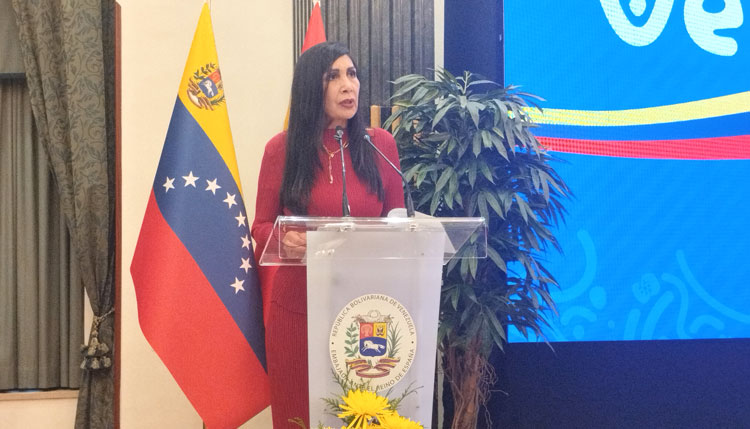Juan David Latorre
Last Tuesday, June 24, the Venezuelan Embassy hosted a reception in commemoration of Venezuela’s Independence Day and the Bolivarian National Armed Forces.
In her speech, Venezuelan Ambassador Gladys Gutiérrez Alvarado welcomed various dignitaries, including Alexandre Pupo Quintino, Secretary General of the International Youth Organization for Ibero-America; Lorena Larios Rodríguez, Secretary for Ibero-American Cooperation; Julio Navas López, Deputy Director General for Andean Countries at the Ministry of Foreign Affairs, European Union and Cooperation; and representatives of the Diplomatic Corps residing in Spain.
The Venezuelan ambassador noted that this event commemorated “the signing of the Declaration of Independence on July 5, 1811, which celebrates its 214th anniversary this year.” “This is a meeting between representatives of sister nations and a moment to share with you the reflections that this date always inspires us: the truth about Venezuela, its achievements, challenges, and its prospects for a successful future.”
“The events of July 5, 1811,” the ambassador continued, “transcend the mere fact that constituted the State to become the authentic cornerstone from which the notion that permeates the core identity of all our fellow citizens springs: free will and national sovereignty. These principles continue as a continuum in the signing of the Act of Independence, developing into the Constitution of the Bolivarian Republic of Venezuela of 1999, freely approved in a popular referendum by the Venezuelan people and which is celebrating 25 years since its approval. The preamble and its entire text evoke the creative powers of the People, the historical example of Simón Bolívar, and the heroism and sacrifice of our aboriginal ancestors and the precursors and forgers of a free and sovereign homeland, with the supreme goal of establishing a participatory, leading, and multicultural society in a State that consolidates the values of peace, solidarity, and solidarity.” and national autonomy.”
“The unilateral coercive measures that have been applied against Venezuela since late 2014 and that continue to this day have been established, as we know and deeply regret, due to the ancestral ties between the Venezuelan nation and the nation that, illegally and unjustly, imposes them as a form of economic, financial, and commercial blockade. Their ultimate purpose has been to reverse the general evolution that Venezuela has experienced since 1999. And they are in themselves the most convincing and clear proof that our nation has indeed managed to consolidate its full independence. However, the country as a whole, and above all the Venezuelan people, are facing the extremely serious effects of the aforementioned coercive measures with gallantry and resilience, thanks to their capabilities and the leadership of the Head of State, President Nicolás Maduro Moros,” Gladys Gutiérrez stated.
The Venezuelan ambassador continued, emphasizing that “our country has been positively recovering from these measures, promoting the harmonious development of the national economy, strengthening respect for human rights, and ensuring the full realization of the collective right to self-determination, including our inalienable right to control all the wealth and natural resources of the Venezuelan nation. Likewise, Venezuela continues to deepen and implement its Bolivarian Peace Diplomacy, the doctrine on which its foreign policy is based, a permanent exercise of the principles of mutual respect, self-determination of peoples, and international cooperation for the construction of a multipolar and just world. Our diplomacy is characterized by the promotion of dialogue, negotiation, and the search for peaceful solutions to conflicts, as well as by the strengthening of regional integration and solidarity among nations, with special emphasis on South-South cooperation. Inspired by the legacy of Simón Bolívar, its strategic objective is to apply the ideals of unity, independence, and social justice promoted by the Father of the Nation to contemporary international relations.”
Gladys Gutiérrez recalled that Venezuela is a member of multiple integration organizations, including the Group of Friends in Defense of the United Nations Charter, “a recent initiative that seeks to restore respect for international law enshrined in the aforementioned founding text of the United Nations Charter. Based on a proposal from this Group of Friends, December 4th was proclaimed the International Day against Unilateral Coercive Measures, a symbolic measure that seeks to raise awareness in the international community about these unjust and illegal procedures.” To conclude her remarks, the Venezuelan ambassador emphasized that “all Venezuelan popular forces demonstrated in the streets in solidarity with Palestine and Iran. President Maduro addressed this massive show of support from our people, stating: ‘Peace mobilizes us. I thank and congratulate the brave, supportive Venezuelan people who, with great love, took to the streets of Caracas to express their support for our brothers and sisters in Palestine and the Islamic Republic of Iran. It was a mobilization against war and in favor of peace.”
Two key guests then spoke: Representative Enrique Santiago, of the Communist Party of Spain, Vice President of the Foreign Policy Commission of the Congress of Deputies, and Francisco Palacios Romeo, PhD in Constitutional Law and Deputy Director of the Department of Public Law at the University of Zaragoza. The two protagonists expressed their support for the Venezuelan people and government in lengthy speeches.
To conclude the formal events, a showcase of Venezuelan culture took place with the compositions of the cult figure Alí Primera, the people’s singer, performed by one of his descendants and successor to his work, Alí Alejandro Primera, accompanied by his musical group.
